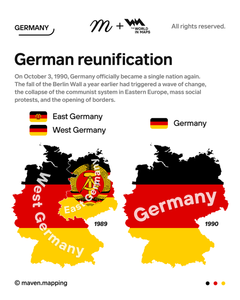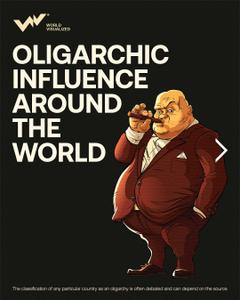democracy
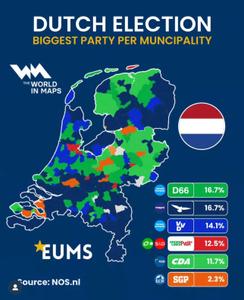
Politics / 8 weeks ago
Netherlands’ local map mirrors broad shake-up in Dutch politics
According to exit polling and early vote tallies, the Netherlands' social-liberal Democrats 66 (D66) surged to historic heights, while the far-right Party for Freedom (PVV) saw its support falter in the wake of the government’s collapse earlier this year. The electoral map you’re viewing shows how many municipalities gave D66 the lead, transforming previously contested zones into zones of new influence.
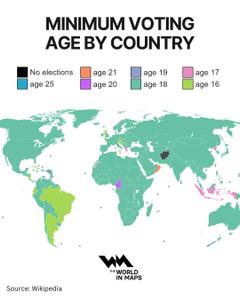
Politics / 12 weeks ago
How old do you have to be to vote?
While 18 years old remains the most common minimum voting age, there is significant variation across countries, from 16 to 21, and even 25 in rare cases. According to the Wikipedia overview of voting ages, most nations use 18 as the legal voting threshold. A handful lower it to 16 or 17, and the United Arab Emirates remains an outlier with a voting age of 25. That data is echoed in broader surveys: nearly 202 countries hold 18 as their standard voting age, while only 10 use 16, and 4 use 17.
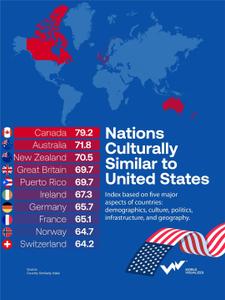
Culture / 13 weeks ago
The countries that look, feel, and act most like the United States
When people talk about America’s closest allies, they often focus on politics, trade, or military partnerships. But what about cultural DNA, the deep similarities in demographics, politics, infrastructure, and everyday life? According to the Country Similarity Index, a data-driven ranking that compares nations across five major dimensions, the United States’ closest cultural cousin is its neighbour to the north, Canada, with a striking similarity score of 79.2.
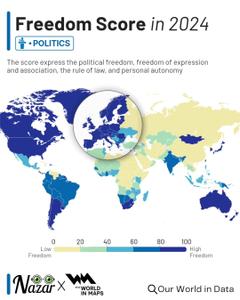
Politics / 17 weeks ago
Which countries are most free in 2025?
A new map from The World in Maps and Nazar brings political freedom in 2024 into sharp focus. Drawing on data from Freedom House’s freedom score, it paints the globe in shades that range from deep blue to pale yellow, each colour a reflection of how free, or constrained, life is within a nation’s borders. Behind those colours lies a detailed framework: up to 40 points measure electoral processes and political pluralism, while the remaining 60 points capture freedoms that shape daily life, such as speech, association, the rule of law, and personal autonomy. Together, these 25 indicators offer a powerful snapshot of democracy and liberty in today’s world.
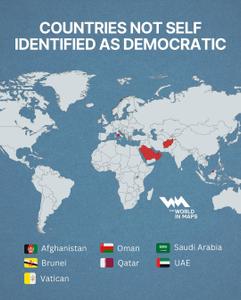
Politics / 18 weeks ago
7 countries that don’t claim to be democracies
Nearly every government in the world brands itself as democratic. However, there are a handful of exceptions. Seven countries do not identify as democracies: Afghanistan, Brunei, Oman, Qatar, Saudi Arabia, the United Arab Emirates (UAE), and Vatican City.
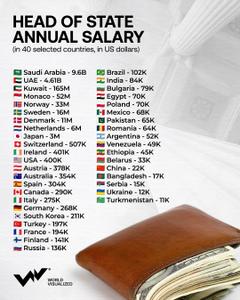
Business / 23 weeks ago
World leaders' annual salaries show vast global disparities
A new report from the World Population Review unveils eye-opening figures about the annual salaries of heads of state across 40 selected countries. The data provides insight into how national leaders are compensated and how that compensation compares to their countries' economic realities. At the top of the chart, Saudi Arabia’s head of state stands out with a huge $9.6 billion annual salary. Not far behind is the United Arab Emirates (UAE) at $4.61 billion, followed by Kuwait with $165 million and Monaco at $52 million. These figures, mostly from oil-rich monarchies or high-net-worth microstates, dwarf the salaries of leaders in Western democracies.
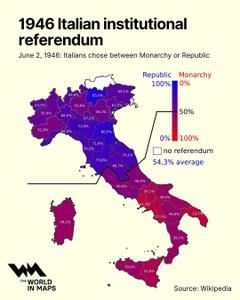
Politics / 29 weeks ago
What triggered the 1942 institutional referendum in Italy?
Italians on June 2, 1946, went to the polls for a pivotal referendum that would shape the nation’s future: should Italy remain a monarchy or become a republic? In a landmark decision, 54.3% of Italians voted in favour of establishing a republic, bringing an end to the reign of the House of Savoy and setting the stage for the birth of modern Italy.
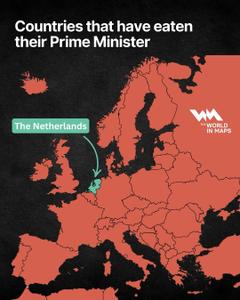
Politics / 30 weeks ago
The Netherlands: The only country that 'ate' its prime minister
In 1672, Johan de Witt, who served as the Grand Pensionary (effectively the Prime Minister) of the Dutch Republic, met a horrifying end in The Hague. Amidst political chaos, economic hardship, and foreign invasion, de Witt was blamed by angry mobs for the country’s misfortunes. He and his brother, Cornelis, were lynched by a mob fuelled by political rivalries and orchestrated propaganda, as detailed by LBV and multiple historical accounts.
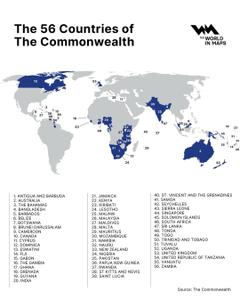
Politics / 31 weeks ago
The Commonwealth at a glance: A global alliance of 56 nations and 2.5 billion people
With a footprint that spans every inhabited continent, the Commonwealth of Nations is one of the most expansive and culturally diverse political associations in the world. Comprising 56 countries and representing over 2.5 billion people, or nearly one-third of the global population, the Commonwealth remains a powerful force in shaping 21st-century multilateral diplomacy and development. From small island states like Tuvalu and Dominica to major economies such as India, Canada, and Australia, the Commonwealth includes countries of vastly different sizes, geographies, and histories.
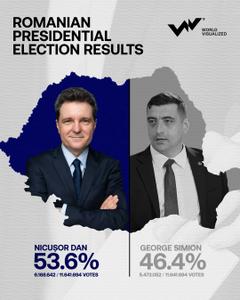
Politics / 32 weeks ago
